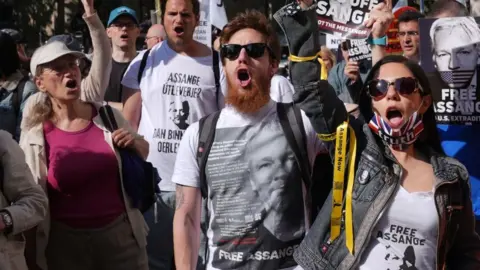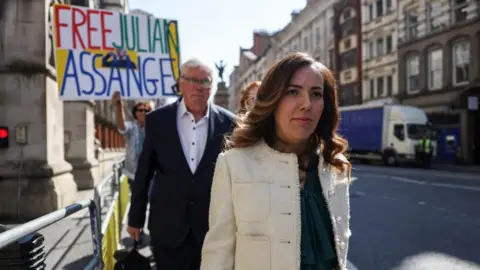'Decisive' day for Assange extradition battle
 PA Media
PA MediaJulian Assange is under "enormous pressure" as he awaits a ruling on his right to appeal against extradition to the US, his wife says.
Stella Assange told the BBC that Monday would be a "decisive" day in the Wikileaks founder's protracted legal battle.
If the High Court rules against him, Ms Assange says the 52-year-old could be on a plane to the US in as little as 24 hours.
She said her husband would then seek an emergency injunction from the European Court of Human Rights (ECHR) as a last-ditch attempt to halt the extradition.
US authorities say Mr Assange endangered lives by publishing thousands of classified documents.
His lawyers have argued that the case against him is politically motivated.
Then-home secretary Priti Patel signed Mr Assange's extradition order in 2022, but he returned to the High Court in February 2024 to ask for permission to appeal.
In Monday's hearing, judges will decide on whether the US has given adequate assurances on the conditions of Mr Assange's potential extradition.
After proceedings began, his lawyers told the High Court they accept he will not face the death penalty if extradited to the United States - but other assurances regarding a fair trial should not be trusted.
At a hearing in March, the US government was given additional time to make assurances to the court on the death penalty and two other grounds:
- that Mr Assange would be able to rely on the first amendment to the US constitution - which protects free speech
- that his Australian nationality would not count against him
Last month, judges confirmed the US had provided assurances to the court.
If the court rules in the US's favour after hearing arguments from both sides on Monday, Mr Assange's bid for a final UK appeal will be refused. He will have exhausted all legal avenues in the UK.
If the court rules Mr Assange's way, he will be allowed to appeal against his extradition in the High Court at a future date, meaning he will remain in the UK for now.
 Reuters
ReutersMr Assange has resisted extradition from the UK for over a decade after his Wikileaks website published thousands of confidential US documents in 2010 and 2011.
The US Department of Justice described the leaks as "one of the largest compromises of classified information in the history of the United States".
The leaked files suggested the US military had killed civilians in unreported incidents during the war in Afghanistan.
US authorities say Mr Assange endangered lives by failing to redact the names of intelligence operatives in the documents, but his lawyers have argued that the case is a politically motivated form of "state retaliation".
"He exposed literally war crimes," Stella Assange told BBC Radio 4's Today programme on Monday. "This case is the revenge of that country against openness and accountability."
Ms Assange has two children with the Wikileaks founder, who she married in Belmarsh Prison in 2022. She says she hasn't told them that their father could be extradited.
"They don’t understand the concept of extradition or that their father might be taken away from them. So I just tell them that we’re fighting to free him and we make plans about what we’ll do when he’s free.”
Dozens of people gathered outside the Royal Courts of Justice on Monday morning to support Mr Assange.
Kaylaa Sandwell, who travelled from south-east London to attend the rally, said the case had come to a "crunch point".
"He needs to be freed because he hasn't done anything wrong," she said. "If he doesn't get freed, we won't have a free press anymore."
Though Monday's hearing could represent his last chance to resist US extradition through the UK courts, Mr Assange does have another hope.
Last month, US President Joe Biden said he was considering a request from Australia to drop Mr Assange's prosecution and return him to his native country.
